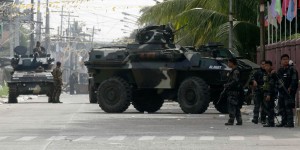Enduring pain after Muslim rebel attack Zamboanga City

Government troopers maneuver their Armored Personnel Carrier to reinforce their comrades after an army officer was killed in the ongoing operation against Muslim rebels on Thursday, Sept. 19, 2013, the 11th day of the standoff in Zamboanga city in southern Philippines. AP FILE PHOTO
ZAMBOANGA, Philippines – Thousands of people displaced by a Muslim rebel assault on a major Philippine city are enduring squalid conditions in an evacuation camp where dozens have died, while the guerilla leader remains free one year on.
The attack by Moro National Liberation Front gunmen triggered three weeks of urban battles with the military in Zamboanga, a southern port city, which left more than 240 people dead.
As Zamboanga this week marks one year since the conflict began, about 11,000 people whose homes were destroyed are still living in the city’s sports stadium, where atrocious conditions are regularly claiming lives.
“Life is difficult here. You have to line up to draw water from the faucet,” said housewife Vilma Diosma, 43, who shares a tent with her young sons and another family at the sports stadium.
“If you want to use the toilet you have to queue up, and bring your own pail of water to flush. My children are really suffering.”
Article continues after this advertisementPneumonia, dysentery and other illnesses generated by the slum-like conditions have claimed 168 lives over the past year, according to Rodelyn Abulos, who is in charge of the city’s health services.
Article continues after this advertisementHe said most of the deaths occurred in the first few months after the conflict when the makeshift evacuation camp was more crowded, but diseases linked to the poor conditions were still killing people.
Portable toilets are so scarce that there is an average of one for every 50 people, according to the city government, while children walk along muddy paths amid flimsy shanty homes on what used to be the grass of the stadium.
Overwhelmed
The cash-strapped Philippine government struggles to provide basic social services even in normal times, with roughly one quarter of its 100 million people living below the poverty line.
However, the Zamboanga conflict occurred at the start of a particularly devastating stretch of disasters that overwhelmed the relief-providing capacities of the government and aid agencies.
A 7.1-magnitude earthquake and Super Typhoon Haiyan, the strongest storm ever recorded on land, claimed more than 7,500 lives late last year across the central Philippines.
Tens of thousands of survivors from Haiyan, as well as deadly storms from previous years, also continue to live in makeshift shelters or evacuation camps.
In Zamboanga, the government has struggled for resources and manpower to rebuild the roughly 10,000 homes, mostly belonging to the city’s poorest people, that were destroyed in the conflict.
Most of those homes were set alight by the gunmen, who also took dozens of people hostage, as they sought to deter the surrounding security forces.
At least 116,000 civilians – about 10 percent of the city’s population – fled their homes when the MNLF gunmen sailed in from neighboring islands.
MNLF leader Nur Misuari is accused of organizing the violence in a failed bid to derail a peace accord between the government and a rival Muslim rebel group, the Moro Islamic Liberation Front.
The MILF is close to finalizing a pact that would end a decades-long insurgency that has claimed tens of thousands of lives, and Misuari believes his group has been sidelined in the peace process.
Both groups have been struggling for independence or autonomy for the mainly Catholic Philippines’ Muslim minority, and a new self-rule area planned for the southern Philippines is set to be dominated by the MILF.
The military said 208 MNLF gunmen, 25 security forces and 12 civilians died during last year’s unrest.
However, Misuari did not participate directly in the assault and is believed to be living with sympathetic locals on nearby Muslim-populated islands, avoiding military and police search efforts.
“(Misuari) is in hiding and eventually the law will catch up to him,” Philippine military spokesman Lieutenant-Colonel Ramon Zagala said.
The military has also deployed an extra 500 soldiers to Zamboanga in a bid to prevent a repeat attack.
Meanwhile, the national government has said it is aiming to build enough temporary shelters to close the evacuation camp at the sports stadium by Christmas.